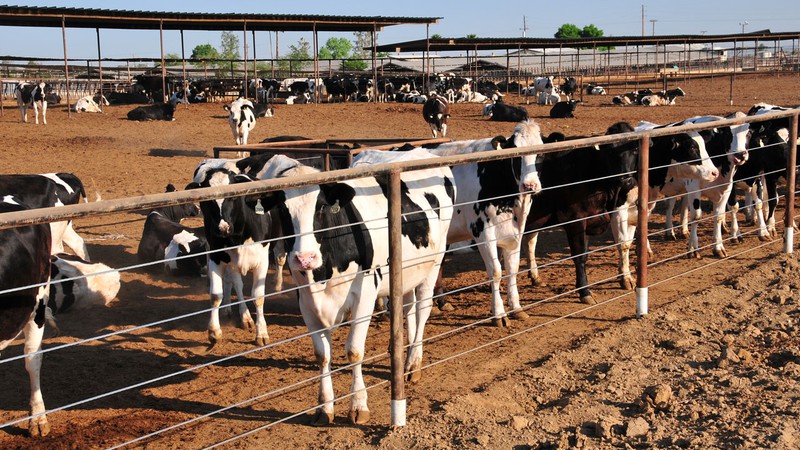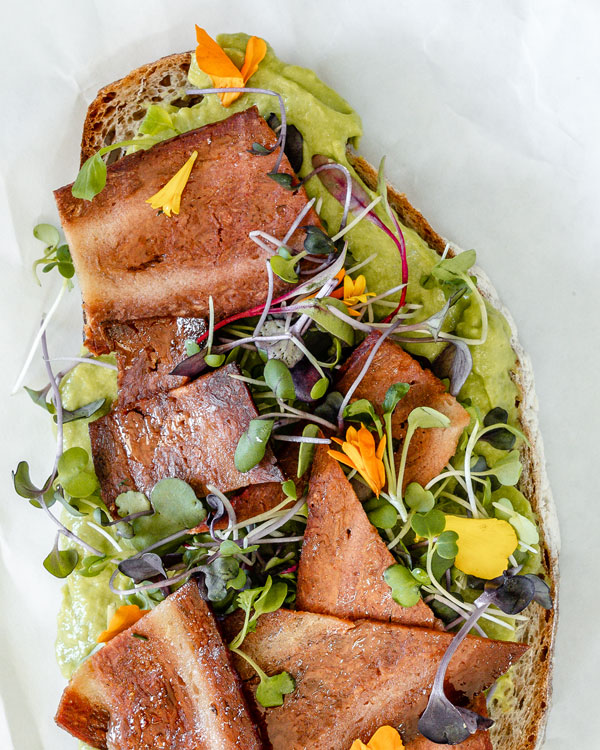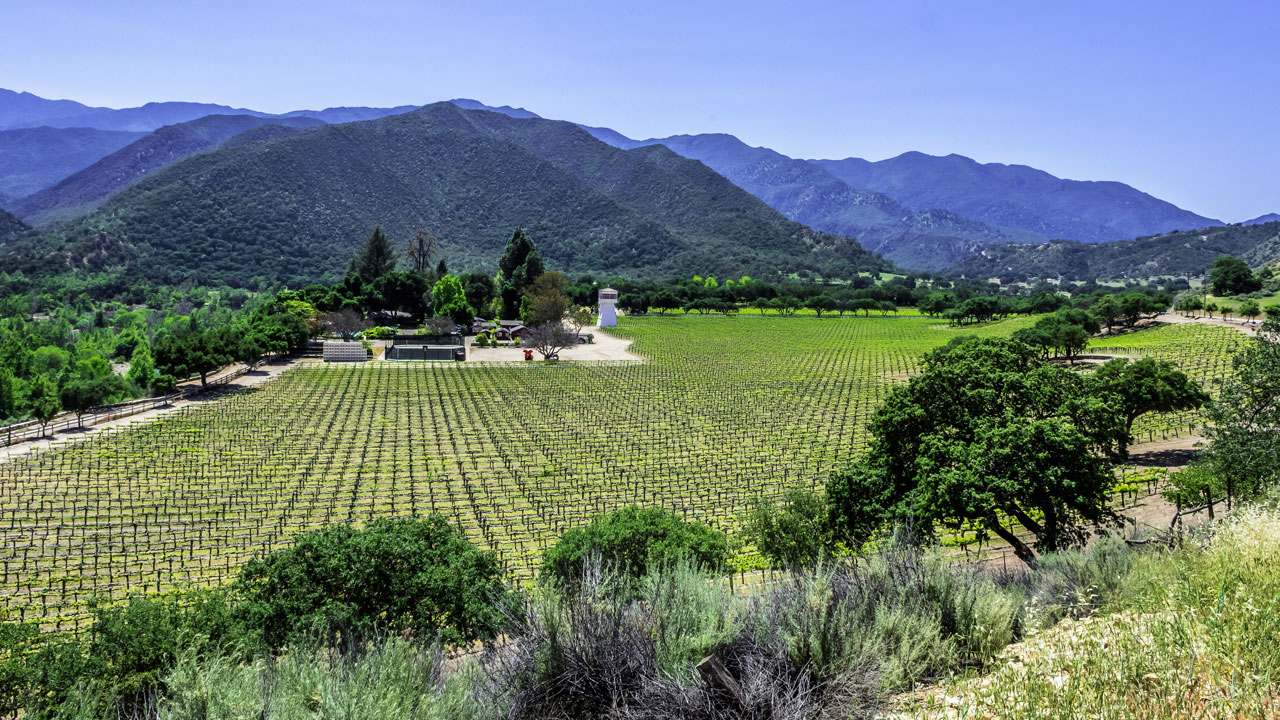Greener ways to feed the world’s growing population

Dairy products are California’s top agricultural commodity, but the industry is often criticized for its impact on the environment. Richard Thornton Shutterstock
As impacts from climate change, global population growth, and increased energy demands intensify, the need for sustainable agriculture has taken on a greater sense of urgency.
With the world’s population projected to increase from 7.9 billion in 2022 to approximately 9.6 billion by 2050, having adequate food production is literally an issue of life and death. To feed future generations, and at the same time conserve energy and protect the planet, we must implement innovative new techniques for growing food.
And nowhere is this imperative more evident than in California, our country’s most populous state, with nearly 40 million residents. Not surprisingly, California is the top agricultural producer in the U.S., growing over a third of the country’s vegetables and three-quarters of the country’s fruits and nuts. And the Golden State has been fertile ground for introducing sustainable agriculture and food production practices that bypass industrial farming methods, which are notorious for their energy consumption and pollution.
The state is also home to one of the leading universities in agricultural sciences, the University of California Davis. The university announced recently that Beverly Hills philanthropists Lynda and Stewart Resnick donated $50 million to the university to build a center focused on agricultural innovation and research. The Resnicks, through their corporation the Wonderful Co., own such brands as POM Wonderful, FIJI Water, and Wonderful Pistachios.
The 40,000-square-foot hub, dubbed the Lynda and Stewart Resnick Center for Agricultural Innovation, will have classrooms and research and lab space. It’s expected to be completed by 2026. The new center “will explore new ways of balancing food production with leading sustainability practices while advancing the global agricultural industry with scalable solutions,” according to UC Davis.
That’s just one example. Below, California Local details other innovations in sustainable agriculture and food production happening in the state.
Dairy products are California’s top agricultural commodity, valued at $7.57 billion last year, according to the California Department of Food and Agriculture. But a West Sacramento biotechnology startup is investigating new ways to produce milk that could forever change the dairy industry, which is often criticized for various environmental and animal cruelty issues.
As opposed to the tried-and-true method of simply milking cows, TurtleTree is experimenting with technology to turn mammal cells and microbial strains into cell-based milk. The process involves growing cells in TurtleTree's labs, which are then processed in a bioreactor, which ultimately produces milk.
Whether TurtleTree will be able to successfully compete in the growing alternative dairy industry remains to be seen. Among the many hurdles the company must clear is getting the Food and Drug Administration to approve its product.
Nonetheless, TurtleTree, which is headquartered in Singapore, is finalizing the construction of its 24,000-square-foot research and development facility in West Sacramento. Technology entrepreneurs Lin and Max Rye founded the company in 2019. Since then, the company has raised about $40 million from venture capital investors. The facility, which is expected to open in 2023, will employ approximately 40 people.

While TurtleTree is looking to disrupt the dairy industry, another West Sacramento startup hopes to change how we produce meat. Founded in 2018, The Better Meat Co. uses a special fermentation process to make Rhiza, a neutral-tasting, whole-food mycoprotein (ingredients include potatoes and special fungi roots) that has the texture of animal meat. The company claims Rhiza has more iron than pork, turkey, and beef, and more protein than eggs.
The Better Meat Co. is a business-to-business company that sells its Rhiza products to other food producers, like Hormel Foods Corp. and Perdue Farms, which use them to make or enhance animal-free steaks, burgers, chicken, and other items. The company indicates that its food-production process does away with the cruelty of factory farming, as well as the enormous amount of land, water, and greenhouse gases it takes to raise and slaughter animals for food.
In June 2021, the company completed the renovation of its 14,000-square-foot West Sacramento research lab and production facility. About 20 people work at the headquarters, where the company maintains its three-story fermentation vessel. In October, Better Meat Co. received its fourth patent for the Rhiza fermentation process. Company CEO Paul Shapiro said the West Sacramento location is a demonstration-scale plant; ultimately, he wants to open other plants to provide sustainable protein around the world.
Oftentimes, it’s argued that implementing new sustainable practices can negatively impact the business community. But a new law that took effect in 2021 is designed to help protect the environment and enable business owners to save money.

Assembly Bill 239, written by Assemblymembers Carlos Villapudua (D-Stockton) and Robert Rivas (D-Hollister), allows California wineries to refill wine bottles at off-site tasting rooms, similar to how the brewing industry has done with reusable growlers. Before the new law, wineries were only allowed to refill containers in tasting rooms attached to production facilities.
The California Department of Alcoholic Beverage Control temporarily lifted this rule during the COVID-19 pandemic to provide financial relief for winegrowers. AB 239, championed by the Monterey County Vintners & Growers Association, permanently lifted the restriction.
This sustainable measure helps reduce consumer waste by allowing customers to refill wine in glass, metal, or ceramic containers, instead of having to purchase a new bottle. At the same time, winemakers don’t have to buy or use as much packaging, reducing their environmental footprint and boosting their bottom line.
“This bill exemplifies California’s commitment to achieving its sustainability goals through creative and business-friendly ways,” said Rivas in a press release. “Our breweries have already demonstrated how effective growlers are at reducing consumer waste and expanding business—now it’s time to allow our wineries to do the same.”
Dr. Daniel Fernandez with Cal State Monterey Bay includes “fog research” among his areas of expertise. The professor even has a fog lab and he works with his students to collect fog water, which he said has many potential uses, including helping California farmers offset their water needs.
Fernandez collects fog water using mesh nets mounted on square frames. As the fog water droplets collect on the nets, their weight causes them to drip down into a trough below. Under the right conditions, a square meter of netting can collect several gallons of water in a single day, according to Fernandez. According to his site Bayside Fog Collectors, Fernandez and his students have built and deployed more than 40 units around central and Northern California.
While this is literally just a drop in the bucket—the EPA indicates the average American family uses more than 300 gallons of water per day at home—Fernandez believes collecting fog water can be part of a multi-pronged approach to help address water shortage issues.
Water has long been a scarce resource in California, a problem that has only intensified over the past several years because of ongoing droughts. A recent report by the California Department of Water Resources indicated that about 73 out of the state’s 414 water suppliers reported they will soon face potential shortages.

For centuries, cultures have used various methods to collect fog water to produce potable water, especially in regions with little rainfall or access to rivers and lakes, like Chile, Guatemala, Israel, and Peru. Fernandez said an array of fog nets could be used in areas like California’s Central Valley, where wide-open farm fields typically see heavy fog in the winter months.
Fog appears under humid conditions when water vapor condenses around dust, air pollution, and other microscopic particles. The water vapor molecules combine to make liquid water droplets that hang in the air, like a low-lying cloud. Fog can be thick or thin, depending on factors like humidity, temperature, topography, and wind conditions. California is noted for its fog, especially in areas like San Francisco and Point Reyes.
Fernandez, who has been studying fog for decades, is also working on several partnership projects, including one with NASA Ames. The research center is looking to use Fernandez’s fog data in conjunction with its satellite images to study how fog affects regional ecosystems and to evaluate if climate change is impacting fog patterns. Fernandez is also working with UC Santa Cruz, which is looking at how fog’s movement over time is a contributing factor to lizards going extinct throughout the world.
A third-generation farmer, Maria Fernanda Reyes saw firsthand the many challenges that exist in the agricultural industry. This experience made her want to find a more efficient and equitable way of doing things, which inspired her to co-found Fairfield-based FarmX, where she serves as global regulatory affairs manager. The other co-founder, Pradeep Karunakaran, serves as executive director for global business transformation.
Created to “elevate farmers and address food waste,” FarmX is a business-to-business e-commerce platform that functions as an online marketplace, where farmers can sell their products directly to restaurants, grocery chains, and other corporate partners. Reyes said the startup is using technology to remove inefficiencies from the food chain and give control back to farmers.
Originally from Sonora, Mexico, Reyes always had an entrepreneurial spirit. At 15 she moved to England, where she earned a degree in international business and marketing management from the University of Kent at Canterbury in the U.K. She relocated to the U.S. in 2009 and was later accepted into a Stanford University graduate program that helps teach Latino entrepreneurs how to launch a business.
Before FarmX, Reyes worked as a food waste manager at Asda Stores Ltd., a British supermarket chain. She also co-founded several ag-tech startups, as well as a nonprofit to support medical workers and indigenous people who lack access to medical care.
Before starting FarmX, Reyes visited farms all over the world, which helped inform her startup’s objectives to boost growers’ productivity, cut costs and reduce food waste. It’s estimated more than 900 million tons of food is thrown away every year, according to a recent UN Environment Programme report.
While most farmers may not be early adopters of e-commerce technology, Reyes hopes they will see FarmX as a fun and educational tool that can help them sell their products and grow their businesses. In the process, she wants to try and fix what she sees as broken and overly complex supply chains that put farmers at a disadvantage.
She got a boost in this effort recently when FarmX won the $10,000 People’s Choice Award at the 2021 UC Davis Big Bang! competition. Reyes said the company will invest the prize money in finding developers to help improve the startup’s technology and user experience. Her short-term goal is to be America’s No. 1 platform for B2B transactions between farmers and businesses, and ultimately, she wants FarmX to be the top platform in the produce industry worldwide.